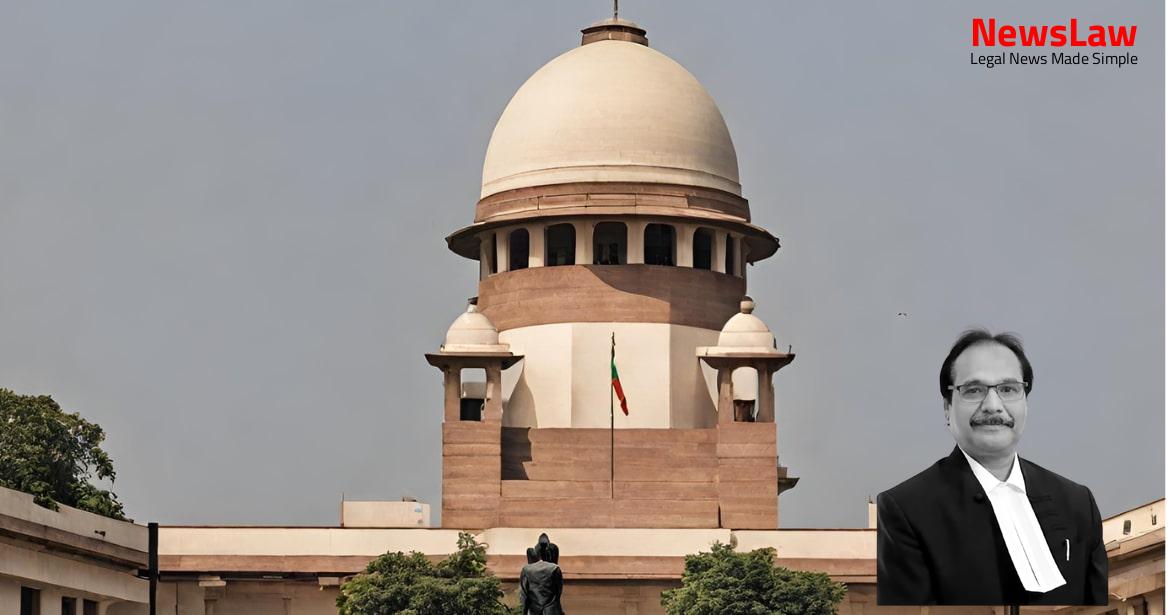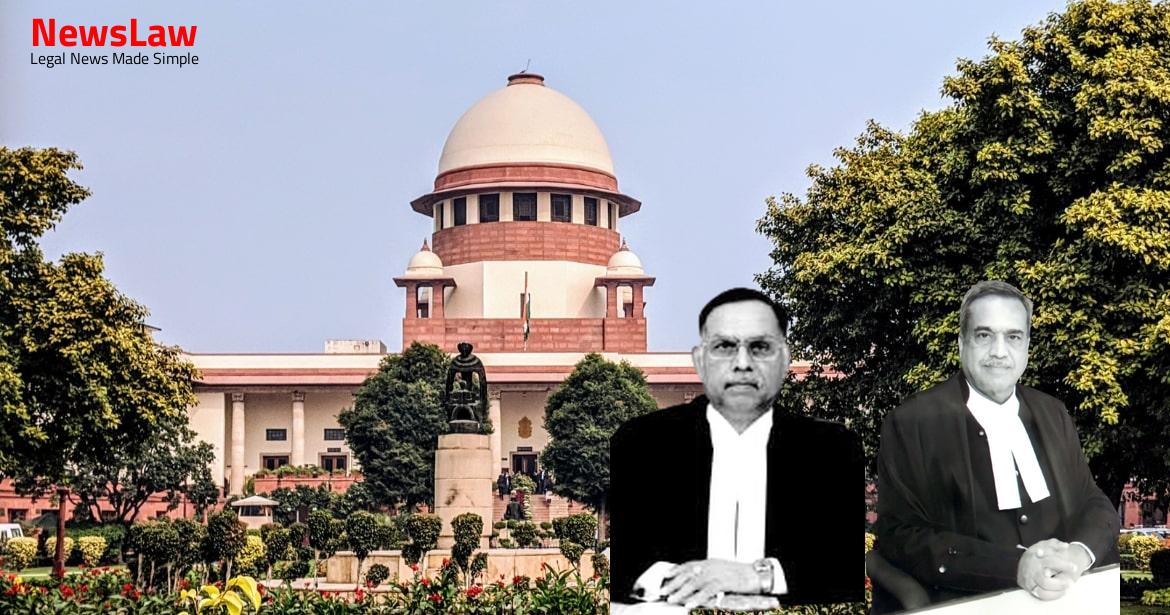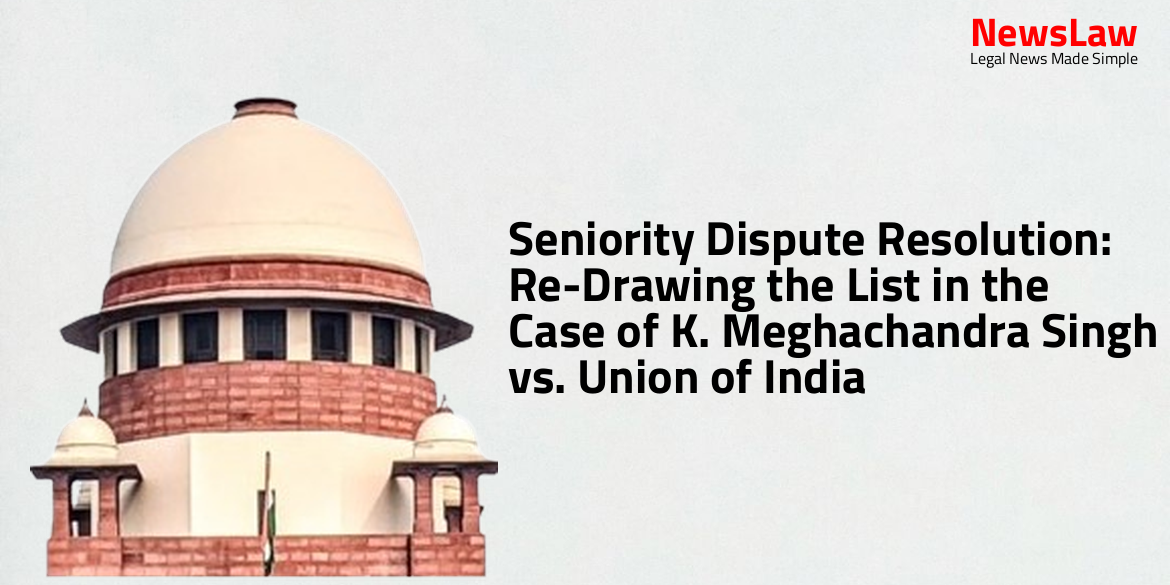In a significant ruling by the Supreme Court of India, the case of Dhanraj v. Shamabai Dhanraj Gugale delves into the intricacies of restitution in legal proceedings. The dispute between the respondent, Dhanraj, and the petitioner, Shamabai Dhanraj Gugale, revolves around the execution of a decree and subsequent auction of properties. This blog explores the nuances of Section 144 of the Civil Procedure Code and the principles of fairness and equity in court decisions.
Facts
- Dhanraj, the husband of the original plaintiff – Shamabai Dhanraj Gugale, advanced a loan of Rs. 8,000 to the original defendant/appellant/judgment debtor in 1969.
- During the pendency of the first appeal, the plaintiff-decree holder filed an execution application which was transferred to the court of Civil Judge, Senior Division, Ahmednagar due to the property falling within that court’s jurisdiction.
- The appellant/judgment debtor’s application for restitution was rejected by the Trial Court, Appellate Court, and the second Appellate Court mainly because the original decree was modified in terms of interest payable, and the judgment debtor did not deposit any amount after the original decree, leading to the property being auctioned off.
- The decree holder sought attachment and sale of various properties of the judgment debtor for decree satisfaction, including land and house properties.
- The Trial Court originally decreed the suit in favor of the plaintiff, awarding principal amount, accrued interest, pendente lite, further interest, and costs.
- Upon the decree being varied by the Appellate Court, the appellant/judgment debtor sought restitution under Section 144 CPC, but by the time the application was made, the decree had already been executed by selling off the judgment debtor’s property to the decree holders.
- The legal issue at hand concerns the restitution of a judgment debtor when a decree is varied, reversed, set aside, or modified as provided under Section 144 of the Code of Civil Procedure, 1908.
- The appellate decree reduced the principal decretal amount from Rs. 27,694/- to Rs. 17,120/-
- The plaintiff executed the decree and auctioned the defendant’s properties before the appellate decision
- The appellant/judgment debtor sought restitution under Section 144 CPC after the decree was varied
- Courts rejected the appellant’s restitution application as no amount was deposited during original decree or appeal
- Appellant’s counsel argued that the auction purchaser, being the decree holder, had no equity in the matter
- Reliance was placed on specific cases to support the argument regarding the auction purchaser’s rights
Also Read: Husband’s Potentiality Test Ordered in Divorce Case: Sharda vs Dharmpal
Arguments
- Mr. Vinay Navare, learned senior counsel for the petitioners, argues that even if the modified decree was for Rs. 17120, the auction sale was inevitable and the petitioners cannot set aside the sale, with their only right being to recover the difference amount of Rs. 10574 under Section 144 CPC.
- The subsequent purchaser cannot be considered a bona fide purchaser, as established in previous cases like Chinnamal, Gurjoginder Singh vs Jaswant Kaur & Anr., and Padanathil.
- The valuation of the property during the attachment Panchanama under Rule 54 of Order XXI does not require a valuation at the time of attachment.
- The argument regarding a hurried auction cannot be raised under Section 144 CPC, as there are specific provisions in Order XXI CPC for such issues.
- The difference in property value from 1985 to 2009 cannot be raised under Section 144 CPC, as it is not within the scope of the provision.
- Restitution under Section 144 CPC is not the sole method of compensating a party, as ‘restitution or otherwise’ is mentioned in the provision.
- The judgment debtor’s rights under Section 144 CPC come into play immediately after reversal or modification of the decree, allowing for relief through compensation or interest.
- The principles of Section 144 CPC must be interpreted broadly, even in cases of decree variation or modification.
- The auction purchaser, respondent no. 3, may be estopped from questioning the validity of the auction due to the self-contained nature of Order XXI and the lack of challenge to the auction proceedings.
- The decree holder had previously sold the land for Rs. 39 lakhs to respondent no. 3, who was aware of the ongoing litigation and agreed to return the amount if the decree holder lost the case, a fact overlooked by the lower courts.
- The purchaser or assignee from the decree holder is not entitled to object restitution even if they are a bona fide purchaser.
- The argument that restitution cannot be claimed against the respondent who purchased the property from the decree holder is based on the difference between variation and reversal of the decree.
- The respondent asserts that they purchased the property as a bona fide purchaser for value and highlights the appellant’s lack of appeal against the trial court’s decree or the confirmation of sale by the Executing Court.
- The extent of variation in the decree/order should be considered by the Court for restitution, making it proportionate to the variation/modification in the decree to ensure equitable justice to subsequent purchasers.
- The judgment in Padanathil Ruqmini Amma counters the argument that the respondent is not entitled to restitution, especially since they had full knowledge of the pending restitution proceedings at the time of purchase.
- The respondent argues that the appellant/judgment debtor is not entitled to restitution due to the inability to pay the reduced decretal amount, making the sale inevitable.
Also Read: Reinstatement of a Class-IV Employee: Legal Analysis
Analysis
- The quantum of restitution considers what the excluded party would have made and what the obligated party could have made.
- A speculative purchaser is in a similar position as the decree holder purchaser.
- The court protects honest outsider purchasers at sales held in execution of decrees.
- The court’s duty is to ascertain if a sale of a part of the attached property would be sufficient to satisfy the decree.
- Failure to evaluate attached properties properly before auctioning them causes injustice to the judgment debtor and benefits the auction purchaser.
- Sale notice under Order XXI Rule 66 CPC provides for proclamation of sale by public auction.
- Restitution is warranted when an ex parte decree is set aside, and the judgment debtor is entitled to seek restitution.
- The court should ensure no act injures the suitors during court proceedings.
- Protecting a third-party auction purchaser who was aware of pending proceedings unjustified for restitution.
- The court auctions must fetch a proper price to benefit the decree holder.
- Protecting outsiders who purchase at court auction while not protecting assignees from decree-holder auction purchasers.
- The sale of attached properties without proper valuation violates mandatory rules and is illegal.
- Bona fide purchasers at court auctions should be protected unless they were aware of pending litigation.
- Restitution under Section 144 CPC aims to place parties in the position pre-decree variation.
- Courts have the inherent power to order restitution and act fairly towards all parties involved.
- Court’s acts should not cause injury to any of the parties involved in legal proceedings.
- Potential buyers should be aware of the risks involved in purchasing property in court auctions.
- Mandatory valuation of property is required before selling attached immovable property in public auction.
- Awareness of the defeasibility of title is expected for assignees of decree-holder auction purchasers.
- Litigation involves an element of chance and awareness of the assignor’s title is crucial for buyers.
- Properties leased to the appellant by the decree-holder auction-purchaser are not subject to restitution.
- Section 144 of the Civil Procedure Code mandates restitution when a decree or order is varied, reversed, set aside, or modified
- Restitution aims to place parties in the position they would have been in if the original decree or order had not been issued
- The court passing the decree or order is responsible for causing restitution upon application of an entitled party
- Restitution may include refund of costs, payment of interest, damages, and compensation
- Sub-rule (2) of Rule 66 of Order XXI CPC further clarifies the procedure for restitution after a decree is reversed, varied, or modified
- No suit can be filed for obtaining restitution if the same relief could be obtained through an application under sub-section 1 of Section 144
- The principle of restitution plays a crucial role in cases involving auction sales and decree-holders.
- A distinction is made between strangers who purchase at court auctions and assignees from decree-holder purchasers.
- Protection is extended to honest purchasers at court auctions, not necessarily to purchasers who are decree-holders themselves or their assignees.
- The policy of protecting strangers at court auctions is to ensure proper pricing and is not applicable to sales outside the court.
- The principle of restitution is statutorily recognized in Section 144 of the Code of Civil Procedure, 1908.
- In cases where a decree is subsequently set aside, the title of a purchaser from a decree-holder in an auction sale can be defeated.
- The court has an obligation to sell only such property or portion thereof as necessary to satisfy the decree.
- The duty to sell only what is necessary to satisfy the decree is a legislative mandate that cannot be overlooked.
- The court’s obligation for restitution arises automatically upon the reversal or modification of a decree, aiming to restore parties to their original positions.
- The Code of Civil Procedure is aimed at facilitating justice and should not be seen as a tool for punishments or penalties.
- The right of a decree holder should not be seen as a windfall simply because they have obtained a decree for a specific amount.
- Decrees are meant for the realization of a certain amount and do not grant excessive benefits to the decree holder.
- Decree holders should not expect to gain more than what was initially decreed.
- Decree holders must adhere to the limits set by the decree and not seek unwarranted advantages.
Also Read: Granting Divorce on Ground of Irretrievable Breakdown of Marriage
Decision
- The appeal is allowed, setting aside the High Court’s order dated 05.06.2017.
- Appellants’ application under Section 144 CPC is allowed.
- Sale of attached properties belonging to the judgment debtor is set aside.
- Parties are restored back to their positions before the attachment of immovable properties of the judgment debtor.
- Execution of the modified decree, if not already satisfied, shall proceed in accordance with the law.
- A decree for realization of a sum in favor of the plaintiff should not lead to exploitation of the judgment debtor by selling his entire property.
Case Title: BHIKCHAND S/O DHONDIRAM MUTHA (DECEASED) THROUGH LRS. Vs. SHAMABAI DHANRAJ GUGALE (DECEASED) THROUGH LRS. (2024 INSC 411)
Case Number: C.A. No.-005026-005026 – 2023



